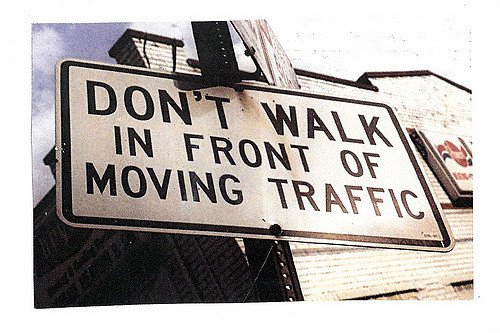
As I watched a woman walking on the narrow shoulder of a busy highway with triplets in a stroller, looking annoyed that she has to deal with all this danger and traffic, I asked myself once again, “Whatever happened to common sense?”
Then the question we never ask occurred to me: “WHY has common sense died?”
In order to answer it, you first have to ask yourself: What IS common sense?
Common sense is basically the application of simple reasoning to everyday life.
Common sense is not enough for a complex area of specialization. You can’t use common sense to do brain surgery, build a rocket, cure an illness or create a microchip.
But in everyday life, we all need common sense. And fewer and fewer of us seem to use it.
There’s probably no one answer here. The closest answer I know of is the decline of reason. You can look at how many families or couples interact, or how our political and social discourse now occurs, and see that reason has mostly gone by the wayside. Business transactions are usually more rational, but not what they used to be or could be, most agree.
It’s tempting to blame the death of common sense on today’s smart phones, which are really computers. Everybody is spending most of their time looking at these pocket computers instead of utilizing their reasoning.
However, common sense has been in decline for much longer than the era of smart phones. The first iPhone went on sale about 2007. But back in 1994, Philip K. Howard wrote a national bestseller entitled, “The Death of Common Sense.” The book resonated with millions. So the issue predates smart phones.
Reason’s decline is a slow, tortured and highly incremental thing. It’s not so much that people consciously reject reason as they gradually replace reason with something else. What’s the “something else”? The only alternative to reason is unreasoned emotion. Feelings — divorced from reason.
There’s nothing inherently wrong or bad about feelings. As a psychotherapist, I’m the first one to acknowledge that. But just as it’s wrong to reject feelings, it’s equally wrong to use feelings as your primary or sole tool of knowing what’s true. Today, more and more people do that. Hence the dawning of the age of The Snowflake.
A rational person feels things. But before blurting out his feelings, or accepting a feeling as automatically valid and true, a rational person stops to think and consider. It’s the stopping, thinking and considering that’s so lacking today. And while smart phones/social media have arguably made the problem worse, the problem existed well before smart phones and social media.
Consider the woman walking with her triple baby carriage in the middle of traffic. It sounds crazy, but I see it ALL the time. I live in a summer resort, and people pile into the town June through August. Most of them are well educated and many are significantly well off. They should be among the best and brightest. But you can see the look of angry frustration on the faces of these people who are resentful that cars, on a busy highway, are preventing them from taking a stroll, or getting to the beach.
It’s a metaphor for so many other things.
If their expressions could talk I think they’d say something like: “I should not HAVE to be dealing with this. How DARE these people be in my way.”
It’s a sense of unearned entitlement. And that’s what fuels the death of common sense.
The substitution of unreasoned emotion for what should have been rational thinking is the underlying issue. But what adds fuel to the fire is a sense of UNEARNED entitlement.
Basically, unearned entitlement tells us, “If I feel something, then it should be true — and treated by others as true.” And that’s what’s behind these people refusing to exercise their common sense. “I shouldn’t have to think about it. It should just be taken care of.” How? Somehow. By whom? Someone who’s able to do it.
If you want to understand why things have gone so wrong in a society with so little excuse for it to have happened — this is it!
The solution? More rational thinking. Reason and self-responsibility are the antidotes to emotionalism and entitlement.
It should be happening in schools, but it’s not. It should be happening in most families. But more and more young people emerge from their families (and schools) with the emotionalism and false entitlement that are toxic and fatal to reason.
It’s a cultural problem that starts as an individual problem — not with all but, regrettably, with most.
We can’t go on like this. Maybe articles and ideas like this one will have more of an impact once the crisis grows to a point where people know we’ve got to do something different.
At times, I think that’s starting to happen. Before long, we’ll know for sure.
Follow Dr. Hurd on Facebook. Search under “Michael Hurd” (Rehoboth Beach DE). Get up-to-the-minute postings, recommended articles and links, and engage in back-and-forth discussion with Dr. Hurd on topics of interest. Also follow Dr. Hurd on Twitter at @MichaelJHurd1, and see “Michael Hurd” on MeWe.
